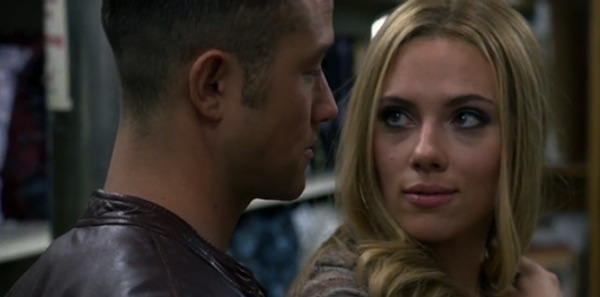Why He'll Be A Great Filmmaker...
4. He Understands The Importance of The "Setup-Payoff" Formula

What separates film from other media is its multi-faceted approach to storytelling. Books rely only on the arrangement and presentation of their words. Plays are also dialogue-reliant, but also have set design and limited visual capabilities. But film truly encompasses the material and feeds it to the audience in a very specific way. No camera movement, no sound effect, and no character action is shown if it's not exactly what the director wants. Watching a play, your eyes can drift around the stage. In a movie, your eyes are where the director tells you to look. The best directors use this knowledge to create visual setups and payoffs. That is, to show the audience an image early in the film, and then show them an extremely similar image later, but with some minor alteration to denote a progression or arc. JGL uses this technique heavily in Don Jon. The entire movie is full to the brim of visual and auditory callbacks. To pick one visual callback (out of many), there is a shot early in the film that simply shows Jon (played by JGL, by the way) walking down a hallway into a gym. The camera is placed in what we assume is the corner of the hallway, and Jon always walks starting from the right background and ends in the left foreground. A simple shot that almost seems unnecessary, but given extraordinary meaning by JGL later. After Jon falls in love, his behavior begins to change. We understand this subconsciously when JGL shows us the same shot I just mentioned: camera corner of the hallway, watching Jon walk right to left into the gym. Only this time, he's walking hand-in-hand with his girlfriend. This second shot, the payoff to the original setup, is telling us that the once girl-hopping bro Jon has transformed into a steady boyfriend.
 What separates film from other media is its multi-faceted approach to storytelling. Books rely only on the arrangement and presentation of their words. Plays are also dialogue-reliant, but also have set design and limited visual capabilities. But film truly encompasses the material and feeds it to the audience in a very specific way. No camera movement, no sound effect, and no character action is shown if it's not exactly what the director wants. Watching a play, your eyes can drift around the stage. In a movie, your eyes are where the director tells you to look. The best directors use this knowledge to create visual setups and payoffs. That is, to show the audience an image early in the film, and then show them an extremely similar image later, but with some minor alteration to denote a progression or arc. JGL uses this technique heavily in Don Jon. The entire movie is full to the brim of visual and auditory callbacks. To pick one visual callback (out of many), there is a shot early in the film that simply shows Jon (played by JGL, by the way) walking down a hallway into a gym. The camera is placed in what we assume is the corner of the hallway, and Jon always walks starting from the right background and ends in the left foreground. A simple shot that almost seems unnecessary, but given extraordinary meaning by JGL later. After Jon falls in love, his behavior begins to change. We understand this subconsciously when JGL shows us the same shot I just mentioned: camera corner of the hallway, watching Jon walk right to left into the gym. Only this time, he's walking hand-in-hand with his girlfriend. This second shot, the payoff to the original setup, is telling us that the once girl-hopping bro Jon has transformed into a steady boyfriend.
What separates film from other media is its multi-faceted approach to storytelling. Books rely only on the arrangement and presentation of their words. Plays are also dialogue-reliant, but also have set design and limited visual capabilities. But film truly encompasses the material and feeds it to the audience in a very specific way. No camera movement, no sound effect, and no character action is shown if it's not exactly what the director wants. Watching a play, your eyes can drift around the stage. In a movie, your eyes are where the director tells you to look. The best directors use this knowledge to create visual setups and payoffs. That is, to show the audience an image early in the film, and then show them an extremely similar image later, but with some minor alteration to denote a progression or arc. JGL uses this technique heavily in Don Jon. The entire movie is full to the brim of visual and auditory callbacks. To pick one visual callback (out of many), there is a shot early in the film that simply shows Jon (played by JGL, by the way) walking down a hallway into a gym. The camera is placed in what we assume is the corner of the hallway, and Jon always walks starting from the right background and ends in the left foreground. A simple shot that almost seems unnecessary, but given extraordinary meaning by JGL later. After Jon falls in love, his behavior begins to change. We understand this subconsciously when JGL shows us the same shot I just mentioned: camera corner of the hallway, watching Jon walk right to left into the gym. Only this time, he's walking hand-in-hand with his girlfriend. This second shot, the payoff to the original setup, is telling us that the once girl-hopping bro Jon has transformed into a steady boyfriend.